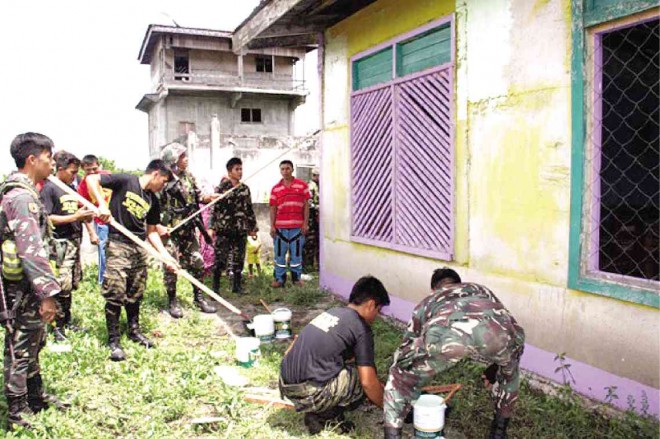
SOLDIERS belonging to the 103rd Infantry Brigade of the Philippine Army and members of the Bangsamoro Islamic Armed Forces-Moro Islamic Liberation Front repaint the elementary school building near Camp Busra in Butig, Lanao del Sur province. RICHEL UMEL
Rasida Abdul looked up to see a strange sight at Raja Muda Elementary School during the opening of classes in Pikit town, North Cotabato province, on Monday: A soldier, aided by a combatant of the Moro Islamic Liberation Front (MILF), climbed up the roofing of the school’s multipurpose hall to patch up holes from bullets and shelling during the past wars.
“We also had a Brigada Eskwela last year, when we came here with brooms to clean the classrooms,” said Rasida, 37. Her daughter, born at the height of the 2000 “all-out war” declared by then President Joseph Estrada, is now in third year high school.
“But it’s the first time for us to have something like this,” she said, gesturing toward the soldiers carrying a piece of plywood to repair the wall of one of the classrooms. “It’s the first time for the Army and the MILF rebels to come together to fix things up.”
The soldiers and rebels were actually trying to get rid of bullet holes, remnants of the four decades of fighting between the MILF and the government.
Raja Muda
Brig. Gen. Carlito Galvez, chair of the government Coordinating Committee on the Cessation of Hostilities, said it was his first time to set foot in Raja Muda, one of the barangays in Pikit that formed part of the major base camp of the MILF in Maguindanao province.
“Soldiers used to come here only to fight,” Galvez said. “Seeing the soldiers and the rebels working together sets a new perspective. Both the rebels and the soldiers are now working together for the education of the children.”
Camp Raja Muda, a base camp of 600 to 800 MILF fighters and covering four to five barangays, had been the battleground in previous clashes between the MILF and the government.
As one of the major MILF camps, it will play a big role in the normalization process since it is where foreign-funded development projects will start pouring in for the rehabilitation and rebuilding process.
Normalization
According to Galvez, Brigada Eskwela is a symbolic part of the normalization process, when the combatants start to work together in the rebuilding and development efforts in areas formerly wrecked by conflict.
Similar activities were also conducted in Camp Busra, another MILF camp in Lanao, and in Camp Badre in Maguindanao.
The Office of the Presidential Assistant on the Peace Process said the series of joint efforts would reach 18 other public schools in areas where MILF base commands operated in the interior barangays of the provinces of Maguindanao, North Cotabato, Lanao del Sur and Lanao del Norte.
Four decades of Moro separatist struggle had not only disrupted classes but also claimed thousands of lives until the government and the rebels signed a peace deal in March last year, which is hoped to pave the way for the creation of a Bangsamoro political entity to replace the current Autonomous Region in Muslim Mindanao.
Rasida said she was hoping that Congress would finally approve the Bangsamoro Basic Law.
She recalled the years when they had to flee Raja Muda to escape the fighting. Her family evacuated to their relatives in the nearby Pagalungan town and was only able to return after three years.
After the breakdown of the peace agreement in 2008, when the memorandum of agreement on ancestral domain was declared unconstitutional by the Supreme Court, Rasida and her family fled their home again to spend a year at an evacuation site in the town center of Pikit.
“We don’t want that to happen again,” Rasida said. “We want this peace to last.”